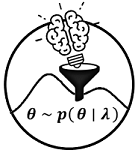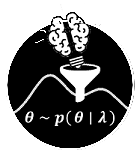# noqa SPDX-FileCopyrightText: 2024 Florence Bockting <florence.bockting@tu-dortmund.de>
#
# noqa SPDX-License-Identifier: Apache-2.0
import tensorflow as tf
import tensorflow_probability as tfp
import numpy as np
import logging
import elicit as el
from scipy.stats import qmc
from tqdm import tqdm
tfd = tfp.distributions
[docs]
def init_method(seed, hyppar, n_samples, method, mean, radius, parameters):
"""
Initialize multivariate normal prior over hyperparameter values
Parameters
----------
n_hypparam : int
Number of hyperparameters.
n_samples : int
number of warmup iterations.
Returns
-------
mvdist : tf.tensor
samples from the multivariate prior
(shape=(n_warm_up, n_hyperparameters).
"""
# set seed
tf.random.set_seed(seed)
# Validate n_samples
if not isinstance(n_samples, int) or n_samples <= 0:
raise ValueError("n_samples must be a positive integer.")
# Validate method
if not isinstance(method, str):
raise TypeError("method must be a string.")
if method not in ["sobol", "lhs", "random"]:
raise ValueError(
"Unsupported method. Choose from 'sobol', 'lhs', or 'random'.")
# counter number of hyperparameters
n_hypparam=0
name_hyper=list()
res_dict=dict()
for i in range(len(parameters)):
for hyperparam in parameters[i]["hyperparams"]:
dim = parameters[i]["hyperparams"][hyperparam]["dim"]
name = parameters[i]["hyperparams"][hyperparam]["name"]
n_hypparam+=dim
for j in range(dim):
name_hyper.append(name)
if hyppar is None:
# make sure type is correct
mean = tf.cast(mean, tf.float32)
radius = tf.cast(radius, tf.float32)
# Generate samples based on the chosen method
if method == "sobol":
sampler = qmc.Sobol(d=dim, seed=seed.numpy())
sample_data = sampler.random(n=n_samples)
elif method == "lhs":
sampler = qmc.LatinHypercube(d=dim, seed=seed.numpy())
sample_data = sampler.random(n=n_samples)
elif method == "random":
uniform_samples = tfd.Uniform(
tf.subtract(mean,radius), tf.add(mean,radius)
).sample((n_samples, dim))
# Inverse transform
if method == "sobol" or method == "lhs":
sample_dat = tf.cast(tf.convert_to_tensor(sample_data),
tf.float32)
uniform_samples = tfd.Uniform(tf.subtract(mean,radius),
tf.add(mean,radius)
).quantile(sample_dat)
res_dict[name]=uniform_samples
else:
uniform_samples=[]
for i,j,n in zip(mean, radius, hyppar):
# make sure type is correct
i = tf.cast(i, tf.float32)
j = tf.cast(j, tf.float32)
if method == "random":
uniform_samples = tfd.Uniform(
tf.subtract(i,j), tf.add(i,j)).sample((n_samples,1))
elif method == "sobol":
sampler = qmc.Sobol(d=1)
sample_data = sampler.random(n=n_samples)
elif method == "lhs":
sampler = qmc.LatinHypercube(d=1)
sample_data = sampler.random(n=n_samples)
# Inverse transform
if method == "sobol" or method == "lhs":
sample_dat = tf.cast(tf.convert_to_tensor(sample_data),
tf.float32)
uniform_samples = tfd.Uniform(
tf.subtract(i,j), tf.add(i,j)).quantile(
tf.squeeze(sample_dat, -1))
res_dict[n] = tf.stack(uniform_samples, axis=-1)
return res_dict
[docs]
def initialization_phase(
expert_elicited_statistics, initializer, parameters, trainer, model,
targets, network, expert):
"""
For the method "parametric_prior" it might be helpful to run different
initializations before the actual training starts in order to find a
'good' set of initial values. For this purpose the burnin phase can be
used. It rans multiple initializations and computes for each the
respective loss value. At the end that set of initial values is chosen
which leads to the smallest loss.
Parameters
----------
expert_elicited_statistics : dict
dictionary with expert elicited statistics.
one_forward_simulation : callable
one forward simulation from prior samples to model-simulated elicited
statistics.
compute_loss : callable
wrapper for loss computation from loss components to (weighted) total
loss.
global_dict : dict
global dictionary with all user input specifications.
Returns
-------
loss_list : list
list containing the loss values for each set of initial values.
init_var_list : list
set of initial values for each run.
"""
seed=tf.identity(trainer["seed"])
tf.random.set_seed(seed)
loss_list = []
init_var_list = []
save_prior = []
# create initializations
init_matrix = init_method(
seed,
initializer["distribution"]["hyper"],
initializer["iterations"],
initializer["method"],
initializer["distribution"]["mean"],
initializer["distribution"]["radius"],
parameters
)
print("Initialization")
for i in tqdm(range(initializer["iterations"])):
seed = seed+1
# create init-matrix-slice
init_matrix_slice = {
f"{key}": init_matrix[key][i] for key in init_matrix}
# prepare generative model
prior_model = el.simulations.Priors(
ground_truth=False,
init_matrix_slice=init_matrix_slice,
trainer=trainer,
parameters=parameters,
network=network,
expert=expert,
seed=seed
)
# generate simulations from model
(training_elicited_statistics,
*_) = el.utils.one_forward_simulation(prior_model, trainer, model,
targets)
# compute loss for each set of initial values
(weighted_total_loss, *_) = el.losses.compute_loss(
training_elicited_statistics,
expert_elicited_statistics,
epoch=0,
targets=targets
)
init_var_list.append(prior_model)
save_prior.append(prior_model.trainable_variables)
loss_list.append(weighted_total_loss.numpy())
print(" ")
return loss_list, init_var_list, init_matrix
[docs]
def pre_training(expert_elicited_statistics, initializer, parameters, trainer,
model, targets, network, expert):
logger = logging.getLogger(__name__)
if trainer["method"] == "parametric_prior":
logger.info("Pre-training phase (only first run)")
loss_list, init_prior, init_matrix = initialization_phase(
expert_elicited_statistics, initializer, parameters, trainer,
model, targets, network, expert
)
# extract pre-specified quantile loss out of all runs
# get corresponding set of initial values
loss_quantile = initializer["loss_quantile"]
index = tf.squeeze(tf.where(loss_list == tfp.stats.percentile(
loss_list, [loss_quantile])))
init_prior_model = init_prior[int(index)]
else:
# prepare generative model
init_prior_model = el.simulations.Priors(
ground_truth=False,
init_matrix_slice=None,
trainer=trainer,
parameters=parameters,
network=network,
expert=expert,
seed=trainer["seed"])
loss_list, init_prior, init_matrix = (None,None,None)
return init_prior_model, loss_list, init_prior, init_matrix

